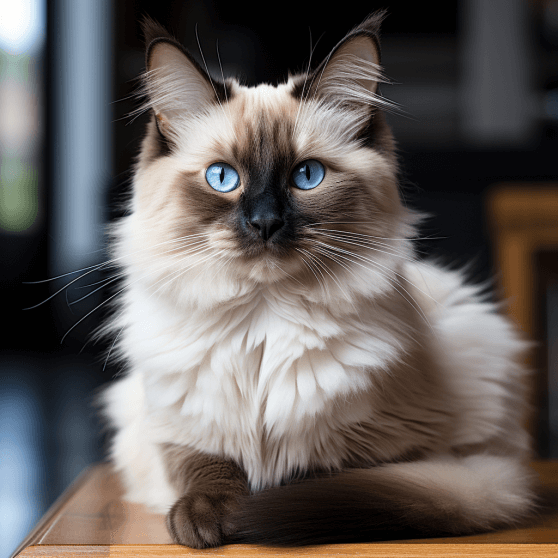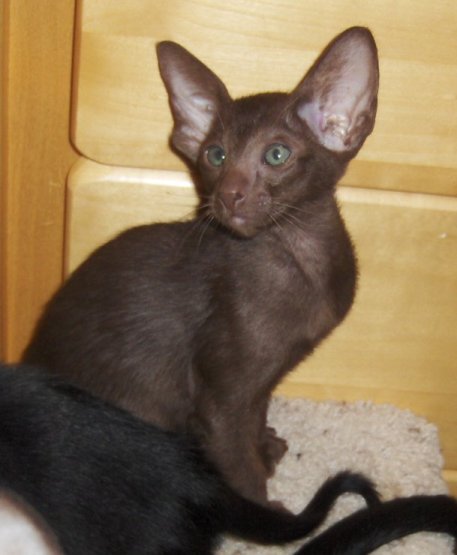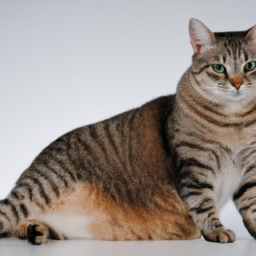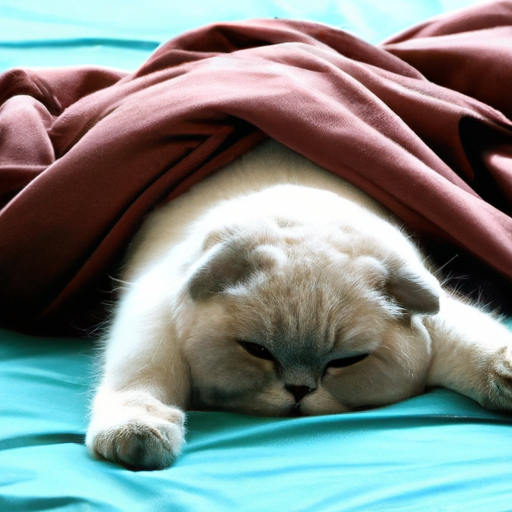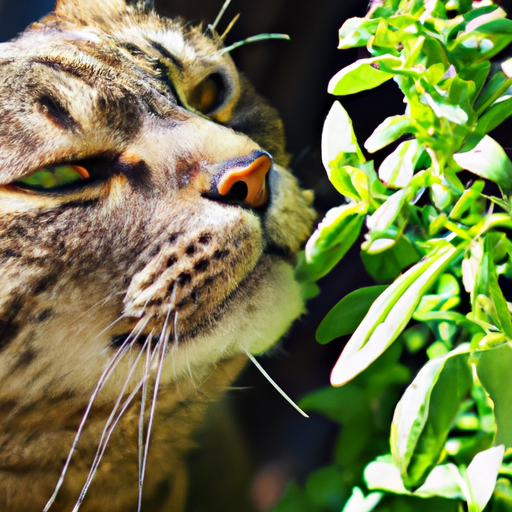Maine Coon
Your interested eyes and playful heart have stumbled upon something extraordinary – Maine Coon, the “Gentle Giants” of the feline world. Aptly named for their place of origin, this breed’s standout characteristics are their large size, shaggy fur, and endearing lion-like mane. In the fascinating realm of felines, the Maine Coon lures cat lovers’ attention with its unique blend of magnificence, mystery, and mischief. Strap in and prepare to be thoroughly enchanted by this elegant specimen of nature’s artistry; a delightful journey awaits you as you delve into the world of the Maine Coon.
History of the Maine Coon
The Maine Coon, with its distinct appearance and charming personality, has gained considerable attention among feline enthusiasts around the world. Before we explore its multitude of characteristics, let’s look into its fascinating history.
Origin stories
While the exact origin of the Maine Coon is shrouded in a veil of mystery, a popular theory traces the roots of this breed back to New England. As the story goes, these cats gained their distinct physical traits overtime by adapting to the harsh New England winters. Another famed tale suggests that the Maine Coon arose from the interbreeding of domestic cats and raccoons, although scientifically, this theory isn’t possible.
Development and recognition as a breed
The Maine Coon gradually gained recognition as a distinct breed in the late 19th and early 20th centuries. These cats were entered in various cat shows and won several accolades, which bolstered their popularity. However, their spotlight was stolen by the arrival of other long-haired cat breeds, like Persians and Siamese.
Survival and resurgence
The popularity of the Maine Coon dwindled around mid-20th century, leading to fears about its extinction. However, a group of enthusiasts began breeding and promoting the cat in the 1950s and established the Maine Coon Breeders and Fanciers Association in 1968. Thanks to these efforts, the Maine Coon regained recognition and thrived, becoming one of today’s most popular cat breeds.
Physical Characteristics of the Maine Coon
Bearing resemblance to its forest-dwelling ancestors, the Maine Coon is awe-inspiring with its robust physique and multi-hued fur.
Size and weight
Considered the largest domesticated cat breed, male Maine Coons usually weigh between 13 and 18 pounds, while females are slightly smaller, weighing between 8 and 12 pounds. Let movement be not mistaken for lack of size, because these cats may stretch up to 40 inches in length from nose to tail.
Coat and colors
A Maine Coon’s luxurious coat is one of its striking features. Their fur can range in color from solid black or white to a mix of colors and patterns, including tortoiseshell and calico. This thick, water-repellent coat helped the breed survive in harsh weather conditions.
Distinct facial features
Besides a prominent muzzle, the most compelling of a Maine Coon’s facial features are their large, oval-shaped eyes that can be green, gold, or copper. Some even have blue or odd-colored eyes. Their ears, high on the head with tufts of fur, give them an almost lynx-like appearance.
Unique bodily proportions
Their bodies are long, muscular, and large-boned, with a broad chest. The tail, as bushy as a raccoon’s and as long as their body, helps them maintain balance and provides warmth during harsh winters.
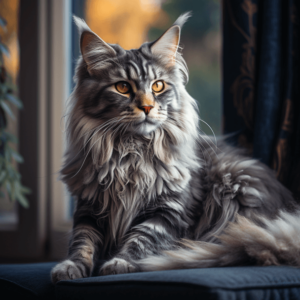
Personality and Temperament of the Maine Coon
Despite its large size, the Maine Coon is known for its friendliness and playful behavior, earning it the moniker “gentle giant.”
General temperament
Maine Coons are affable cats that are known for their intelligence and curiosity. They enjoy spending time both with their human families and alone, exploring surroundings or chasing toys. They usually maintain their playful kitten-like demeanor well into adulthood.
Interaction with humans
Maine Coons develop strong bonds with their human families and can be quite protective. They express fondness towards their owners and are wonderful companions, but they’re not overly dependent and maintain their degree of independence.
Behaviour with other pets
Generally, Maine Coons get along well with other household pets, including other cats and even dogs. However, like any cat, they have their boundaries.
Health and Lifespan of the Maine Coon
While the Maine Coon is generally a healthy breed, it’s important to be aware of potential health risks.
Common health issues
The most common health problems seen in Maine Coons involve the heart and the skeletal system. Some Maine Coons may develop a form of heart disease called hypertrophic cardiomyopathy, while others might suffer from hip dysplasia.
Average lifespan
On average, a Maine Coon cat can live anywhere between 10 to 15 years, though some have been known to live up to 20 years.
Importance of regular vet check-ups
Routine vet check-ups are crucial in detecting early signs of disease, thus ensuring your Maine Coon enjoys a long and healthy life.
Grooming Needs of the Maine Coon
Despite their luxurious fur, Maine Coons are relatively easy to groom.
Frequency of grooming
A weekly combing or brushing is usually sufficient to keep their coat in good shape and prevent common problems like mats and hairballs.
Specific grooming techniques
While brushing their coat, pay special attention to the areas under the legs, which is prone to tangling. Regular nail trimming and ear cleaning are also recommended.
Common grooming problems
Highly prevalent grooming problems in this breed are hairballs, owing to their thick coat, and occasionally, dental problems.
Nutritional Needs of the Maine Coon
A well-balanced diet is key to the Maine Coon’s overall well-being.
Diet requirements
These large cats require high-quality, high-protein cat food to cater to their energy needs. Ensure that your cat gets a balanced mix of nutrients, including vitamins, minerals, and taurine.
Common dietary problems
Excessive weight gain is one problem that Maine Coons can face considering their large size. Monitoring their diet and ensuring regular exercise can help prevent this.
Tips on feeding Maine Coon cats
While dry cat food can help maintain dental health, wet food should also be included to keep them hydrated. Avoid overfeeding your cat and ensure they have ample fresh water available at all times.
Exercise and Play for the Maine Coon
Exercise plays a vital role in keeping your Maine Coon healthy and happy.
Importance of exercise
Regular exercise helps maintain your Maine Coon’s weight, strengthens its heart and cardiovascular system, and prevents behavior problems due to boredom.
Suitable games and play for Maine Coon
As smart and playful cats, Maine Coons love puzzle toys, interactive games, and even enjoy activities like fetch.
Energy levels and exercise needs
Maine Coons are generally active, but they often have laid-back periods during the day too. Scheduling play times during their active period suits best.
Training the Maine Coon
Maine Coons are regarded as intelligent cats, which makes training a relatively smooth process.
Ease of training
Thanks to their friendly nature and intelligence, Maine Coons are generally quite easy to train.
Effective training techniques
Positive reinforcement works best for the Maine Coon, rewarding them for their good behavior or successful accomplishment of a task will encourage them to repeat it.
Common training problems
While Maine Coons are quite trainable, they are independent and may not always follow commands just to please their humans.
Breeding and Genetics of the Maine Coon
Understanding the genetics of the Maine Coon is crucial, especially for breeders.
Genetic diseases and disorders
Maine Coons are prone to certain genetic conditions such as Hypertrophic Cardiomyopathy (HCM) and Hip Dysplasia.
Breeding practices
Successful breeding is greatly tied to the cat’s health and genetics. It’s important for breeders to ensure only healthy cats are bred, thus preventing the passing down of genetic diseases.
Understanding Maine Coon genetics
Maine Coons have dominant and recessive genes that determine their physical characteristics like coat color and pattern, eye color, and size.
Adopting and Owning a Maine Coon
If you’re considering adding a Maine Coon to your family, here’s what you should know about adopting and living with one of these majestic cats.
Choosing a Maine Coon kitten
When adopting a Maine Coon kitten, ensure to choose one that appears healthy and active, with clear eyes and a clean coat.
Cost of owning a Maine Coon
The initial cost of a Maine Coon cat can range greatly, and future costs include food, litter, vet expenses, and occasional grooming.
Responsibilities of a Maine Coon owner
As a Maine Coon owner, your responsibilities will include feeding them a balanced diet, ensuring they get adequate exercise, keeping up with regular vet checkups, and investing time in grooming and bonding.
Owning a Maine Coon comes with much enjoyment, that’s only amplified by watching them grow and prosper under your care. Their gentle nature, coupled with their impressive size and distinct features, makes them a unique and loving companion to have around.


